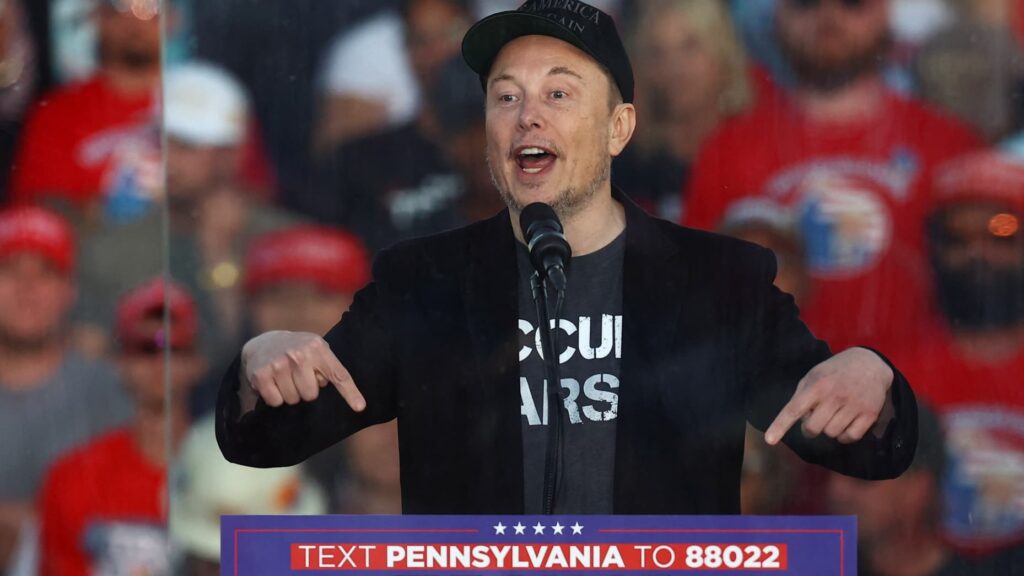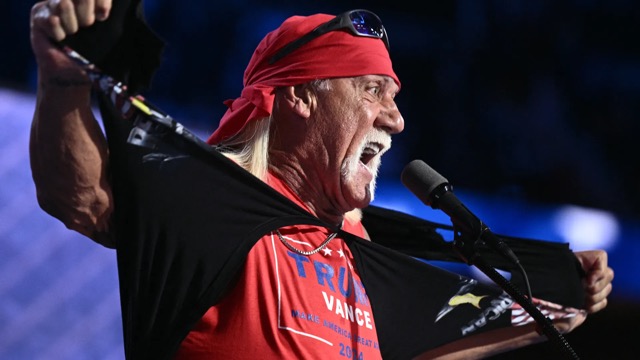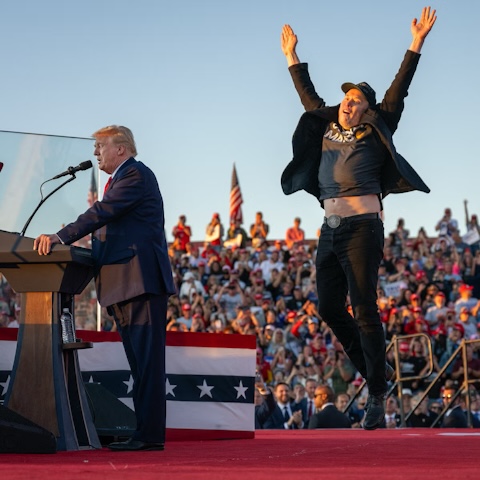
In searching for hidden pokets of support that could change a dead-locked election, Trump Republicans are looking to “the bros.”
These are young men (white, black, Latino), who are under 40, ended their schooling in high school, have modest jobs when they’re working, are often un-married, have not been politically active and see themselves as modeling a particular breed of American masculinity.
It’s one that emphasizes toughness, strength and financial success as well as a suspicion (if not hostility) towards “woke” ideologies. Because some were drawn like moths to a flame by the leadership qualities Trump brought to the White House in 2016, his current campaign has targeted the group as a whole with a vengeance, seeing in them a source of new, first-time voters this election year.
When Harris’s early momentum began to flag a few weeks ago, a greatly diminished Trump—tired, looking old, and struggling to complete a thought—found the perfect avatar for “his kind of man” when the richest contrarian in the world took up his mantle and started offering million-dollar prizes on a daily basis to those who’d take the Trump pledge. With many still on the sidelines, the bros were electrified by the appeal, and Elon Musk became this election’s October surprise just as surely as Hillary Clinton’s “missing emails” turned the tide away from her during the very same weeks of 2016.
Just last August, I’d been puzzled at first by the almost-comic prominence of Trump’s appeal to the bros at the Republican National Convention. Instead, I thought he might start looking for new support among the undecideds who clustered around the political center.
He’d also just survived an assassination attempt, and as the convention built up to his accepting-their-nomination speech. I also expected that there might be more “Thank you for saving him Jesus” than World-Wide Wrestling Federation as they brought him onto the stage, but the agenda had clearly been set in stone long before that bullet grazed Trump’s ear.
So the Republican candidate was heralded by a parade of rough-and-tumble, financially successful men in “the fight business,” culminating in the comic challenge of Hulk Hogan ripping off his shirt at the end of his “Make America Great Again” pitch. Just minutes later, I was whipsawed again when Trump came out and started talking in soft tones about how God had spared him for just this apocalyptic moment.
It was such a U-turn that I found myself down-playing the hour of bro-directed messaging that had come before or how much Trump’s 2024 campaign was a direct appeal to them. Now, several weeks later and on the eve of the election, Hulk Hogan’s ham-handed endorsement has been eclipsed by an even more vital and successful cheerleader, woke-poker, and twisted-genius than the man at the top of the Republican ticket: Elon Musk.
The only thing left hanging today is whether this new celebrity billionaire is the catnip that’s needed so the bros will get it up to vote in sufficient numbers to inaugurate a second Trump presidency.
In 2012’s “Coming Apart: The State of White America, 1960–2010,” political scientist Charles Murray discussed the widening gap that has grown between “the new upper class” and “the new lower class,” largely defined by educational attainment. New lower-class men, in particular, are generally “less industrious, less likely to marry and raise children in a two-parent household, and more politically and socially disengaged.” Their social disengagement, according to Murray, has also involved a flight from traditional religion as a source of personal belief and meaning, so the cohort is amenable to new religion-like commitments. By contrast, a new class of men with higher educations and incomes has tended to resist these outcomes.
Now, a little more than a decade after Murray’s book came out, this divide among American men persists. A few in this new, lower class voted for Trump in 2016, and a few more did so in 2020. The question today is whether laser-like targeting by the Trump campaign and a bro-magnet like Elon Musk can drive a critical enough mass of them to vote and make all the difference in swing-states like mine here in Pennsylvania.

This was Hulk Hogan’s big moment at the RNC in August. For a different modeling of masculinity, here is a link to my post about a music video that plots the transformation of a sullen, island-of-a-man (the terrifically physical British actor Michael Socha) into someone who’s almost akin to a real brother by the time the music ends.
Part of me doesn’t like Elon Musk very much, but that doesn’t mean there isn’t much to admire.
They’re flip-sides of one personality. The same adolescent f*ck the establishment demeanor (see Musk’s daily obsessions on his Twitter/X feed) has also produced a dizzying array of against-all-odds innovations, including building today’s dominant electric car maker in Tesla, as well as SpaceX, the largest satellite launching and internet providing (via Star-Link) company in the world.
Entrepreneurship has made Musk richer than anyone (and a possible role-model to some for that achievement alone) while his “against the world” rebelliousness makes him a natural champion for those who feel like much of the known world has turned against them. Musk’s split screen makes a direct appeal to the undercurrent of rootless men who can easily identify with someone who is (in many ways) even more Trump than Trump. So it’s hardly surprising that the former president’s campaign has welcomed the energy and echo that Musk has brought to it at just the right moment in time.
Of course, Trump was already trying to “bro whisper” enough young men to support his candidacy according to an op-ed last Monday in the New York Times. Its author, John Della Volpe, nicely supplements Charles Murray’s description of Trump’s (and now Musk’s) most targeted voting block:
Today’s young men are lonelier than ever and have inherited a world rife with skepticism toward the institutions designed to promote and defend American ideals. Men under 30 are nearly twice as likely to be single as women their age; Gen Z men are less likely to enroll in college or the work force than previous generations. They have higher rates of suicide and are less likely than their female peers to receive treatment for mental health maladies. Most young men in my polling say they fear for our country’s future, and nearly half doubt their cohort’s ability to meet our nation’s coming challenges.
(My only quibble is with his limiting the cohort to members of Gen Z. My non-scientific observations together with Murray’s underlying data from a decade ago indicate that many lower-class millennial men should also be included.)
Della Volpe’s op-ed concludes with the observation that Trump and MAGA’s cheerleaders are “systematically exploiting the fears and insecurities of young men, making them feel that their masculinity and future are under siege”—and (even more importantly) will continue to be under siege if they don’t get out and vote for the former president.
It’s an appeal that’s difficult, if not impossible, for the Democrats to counter. For example, what do the bros likely hear when Kamala Harris proclaims that she’s a gun owner, loves Formula One racing and once flipped burgers at McDonalds? Most likely that she’s “full of sh*t” and is pandering to them out of desperation instead of trying to find any real common ground. On the other hand, Musk is literally giving them the equivalent of their daily bread (in the form of $1M checks) and circuses (dispensed in a “come on down” lottery of dreams). Manifesting the almost cosmic discrepancy in the parties’ sales pitches, here’s a short film clip of Musk launching his new contest last weekend.
An article that appeared last Thursday about Musk’s latest gambit noted that it had “the goal of nudging 800,000 ‘low propensity voters’ to go the polls in support of Trump, urging them to vote early and register other voters.” As if being given a shot at a million bucks weren’t enough, Musk pushed them even further, saying “the fate of Western civilization” hangs in the balance in this election, while predicting both runaway crime and waves of illegal immigration if Harris wins. They’re appeals to insecurity, made while waving fistloads of cash in their faces.
Despite rumblings from Pennsylvania’s governor and others about “buying votes,” no challenge to these give-aways will likely make them stop in enough time before Election Day. But Musk’s similarities with Trump have another and possibly darker side according to a deeply-researched front page story in the Wall Street Journal this past weekend. Just as the bros are drawn to these “strong and rich men,” both Trump and Musk also seem to be in the thrall of foreign autocrats and unconcerned about how their attractions might compromise the loyalties that they owe to their country.
The story is entitled “Elon Musk’s Secret Conversations with Vladimir Putin: Regular Contacts Between World’s Richest Man and America’s Chief Antagonist Raise Concerns.” It notes how the current American government has found it difficult to challenge Musk’s outreach to Moscow “because it is so dependent on the billionaire’s technologies,” particularly those provided to NASA and the Defense Department by SpaceX. Perhaps to make light of the high stakes for someone like him with national security clearances to be speaking on a regular basis with the Russian leader, Musk tried to dispel any suspicions that are being cast in his direction by jokingly challenging Putin “to one-on-one combat” on his Twitter/X platform.
The bros who were paying attention probably admired his attempt at diffusing a sticky situation in such an off-handedly straightforward way–like Trump’s offer to bring peace to Ukraine in a single day when he makes his own (apparently regular) phone call to the Kremlin shortly after the election.

Trump holds on while Musk jumps for joy at a recent Trump rally.
As I was finishing up writing this on Saturday, the New York Times posted a new interview with Pennsylvania’s junior senator, the hoodie-wearing and in many ways bro himself, John Fetterman.
In his travels around the Commonwealth over the past few weeks, Fetterman has gotten increasingly concerned about the level of enthusiasm for Trump that he’s been witnessing across the state: an “astonishing intensity” of support was how he characterized it. Does Trump have “a special connection with the people of Pennsylvania?” he was asked. “One hundred percent,” he answered.
To explain the recent uptick in enthusiasm, Fetterman said that first and foremost, the locals here have become even more galvanized by Elon Musk’s support for the former president than they were already.
I mean, to a lot of people, that’s Tony Stark. That’s the world’s richest guy. And he’s obviously, and undeniably, a brilliant guy, and he’s saying, Hey, that’s my guy for president. That’s going to really matter….
[W]hen they were having an A.I. conference in Washington, [Musk] showed up at my building at [the Capitol], and senators were like, [Fetterman’s voice gets very high at this point, according to the Times] Ooh, ooh. They were like, I got to have two minutes, you know, please. So if senators are all like ooh! ooh! then can you imagine what voters in Scranton or all across Pennsylvania [are like]— You know, in some sense, [Musk’s] a bigger star than Trump. Endorsements, they’re really not meaningful often, but this one is, I think. And that has me concerned.
Then Fetterman was asked: “How will the vote go in Pennsylvania?” and he said: “It’s going to be much, much closer than anyone would want.”
The only question is whether Musk’s much needed vitality, his true genius and even greater wealth convinces enough of the bros to leave their sidelines for long enough to actually vote for Trump.
Many have never voted before and only a few thousand of them could make a difference in battlegrounds like this one.
From where I”m viewing it, Elon Musk is the October surprise in this nail-biter of an election.
Leave a Reply